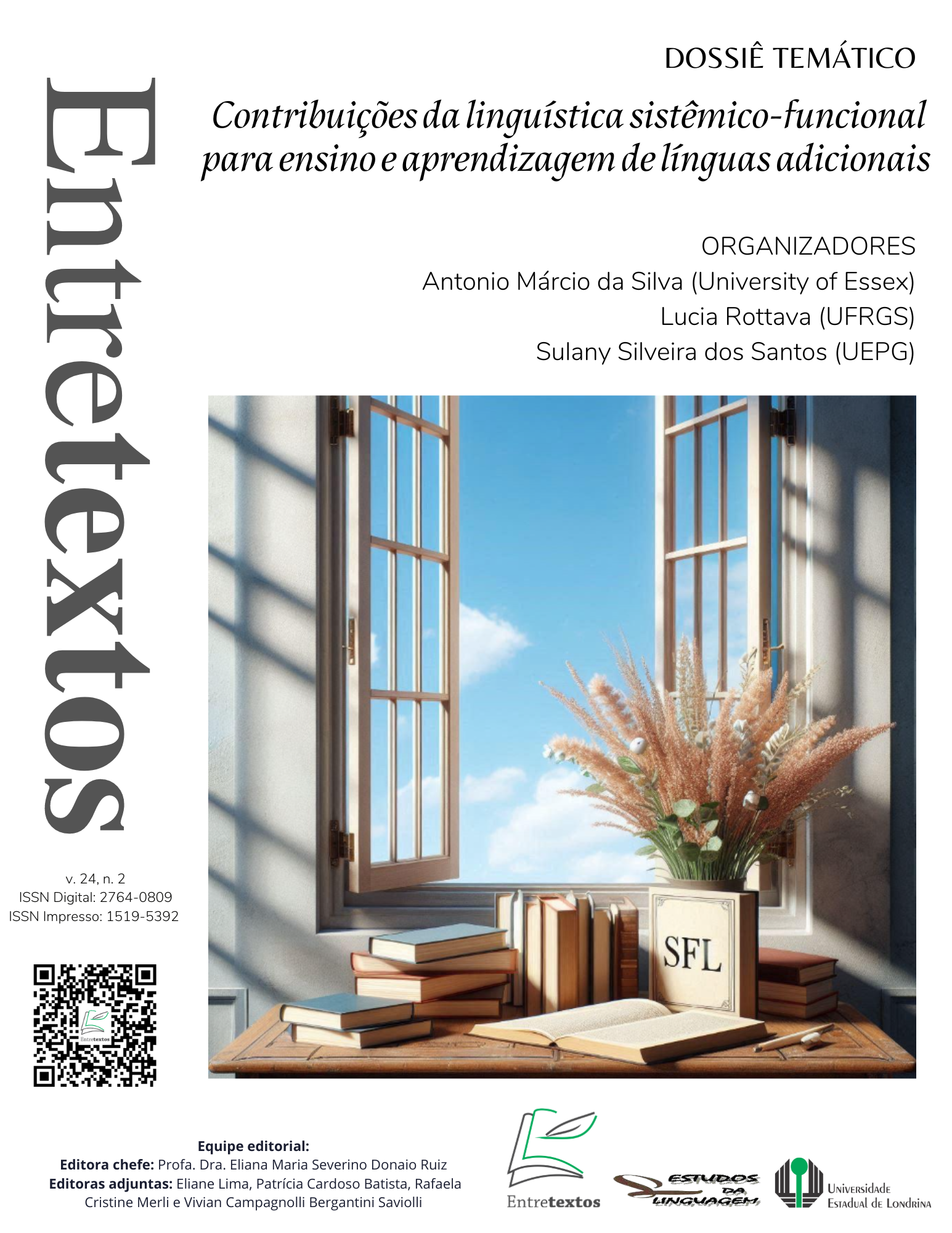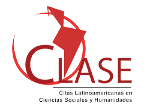Una muñeca, múltiplos aprendizajes: el sistema de valoración en la enseñanza del inglés como lengua adicional
DOI:
https://doi.org/10.5433/1519-5392.2024v24n2p215-237Palabras clave:
Lingüística Sistémico-Funcional, Sistema de Valoración, Enseñanza del InglésResumen
Aprender una lengua extranjera con el título de lengua franca como el inglés implica estudiarla analíticamente para crear inteligibilidad sobre las ideologías transmitidas en los discursos en general. Dado que consideramos el texto como instancia de significado (Halliday, 1994) y como unidad central del trabajo pedagógico (Brasil, 2018), en este artículo presentamos una propuesta para desarrollar material didáctico del inglés para la escuela secundaria, analizando un extracto emblemático de la película de Barbie, estrenada en 2023, que nos lleva a reflexionar sobre temas sociales tan importantes para la formación plena de ciudadanos críticos. Para este emprendimiento, la propuesta se fundamenta en los principios de la Lingüística Sistémico-Funcional (Halliday; Matthiessen, 2004), con enfoque en el sistema de Valoración (Martin; Rose, 2003; Martin; White, 2005). Nos alineamos además con la Lingüística Aplicada Crítica (Grande, 2021) y con la formación docente ético-reflexiva (Miller, 2013), adoptando un enfoque de investigación cualitativo-interpretivista (Denzin; Lincoln, 2006). Lo que proponemos en este trabajo es una práctica pedagógica que supera el nivel lingüístico, con potencial funcional y cuestionador, dados los contextos de situación y cultura en los que nos encontramos, seamos docentes y/o estudiantes.
Descargas
Citas
BATISTA, A. G. A. V.; COSTA LEITE, P. M. C. (Org.). Ensino de inglês por meio de textos midiáticos. In: Fernanda Ribeiro. Práticas de Ensino de Inglês. 1ed.São Carlos: Pedro e João Editores, 2022, v. 3, p. 93-108.
BEATO-CANATO, A. P. M.; JORDÃO, C. (Org.). Escolas e Partidos: ideologias, letramentos e decolonialidade. In: Adolfo Tanzi Neto. Linguística Aplicada de Resistência: transgressões, discursos e política. 1ed.Campinas: Pontes Editores, 2021, p. 97-120.
BOHN, H. I. Ensino e aprendizagem de línguas: os atores da sala de aula e a necessidade de rupturas. In: MOITA LOPES, L.P. Linguística Aplicada na Modernidade Recente. SP: Editora Parábola, 2013, p.79-98.
BRAIDOTTI, R. Posthuman Knowledge. 1.ed. Medford: Policy Press, 2019.
BRAND FINANCE. Toys 25: The annual report on the world’s most valuable and strongest toy brands. Brand Finance, 26 June 2019. Disponível em: https://brandfinance.com/images/upload/toys_25_free_1.pdf.
BRASIL. Ministério da Educação. Base Nacional Comum Curricular. Brasília, 2018.
CRUZ, M. B.; SILVA, T. Barbie Diversidade: o discurso multicultural da boneca na perspectiva das crianças. Construção Psicopedagógica (Impresso), v. 20, p. 91-113, 2012.
CECHIN, M. B. C.; SILVA, T. Assim falava Barbie: uma boneca para todos e para ninguém. Fractal: revista de psicologia, v. 24, p. 623-638, 2012. DOI: https://doi.org/10.1590/S1984-02922012000300012
CHRISTIE, F. Classroom discourse analysis: a functional perspective. Nova York: Continuum, 2002.
DENZIN, N.; LINCOLN, Y. Introdução: a disciplina e a prática da pesquisa qualitativa. In: Denzin, N.; Lincoln, Y. O planejamento da pesquisa qualitativa: teorias e abordagens. Porto Alegre: Artmed, 2006, p. 15-42.
FABRÍCIO, B. F. Linguística Aplicada como lugar de desaprendizagem: redescrições em curso. MOITA LOPES, L. P. da (Org.) Por uma Linguística Aplicada INdisciplinar. SP: Parábola Editorial, 2006, p. 45-65.
FUZER, C; CABRAL, S. Introdução à gramatical Sistêmico-Funcional em Língua Portuguesa. Campinas: Mercado de Letras, 2014.
GERBER, R. Barbie e Ruth: a história da mulher que criou a boneca mais famosa do mundo e fundou a maior empresa de brinquedos do século XX. S.P: Ediouro, 2009.
GRANDE, G. C. Ciborgue, bruxa, professora e o que mais ela quiser ser: Educação Linguística de inglês na universidade. In: Adolfo Tanzi Neto. (Org.). Linguística Aplicada de Resistência: transgressões, discursos e política. 1ed.Campinas - SP: Pontes Editores, 2021, p. 259-285.
HALLIDAY, M. A. K.; MATTHIESSEN, C. M. I. M. Halliday’s introduction to functional grammar. Fourth Edition. London: Routledge, 2014. DOI: https://doi.org/10.4324/9780203783771
HUMPHREY, S.; LOVE, K.; DROGA, L. Working Grammar: An introduction for secondary English teachers. Pearson Australia, 2014.
JENKINS, J. Repositioning English and multilingualism in English as a Lingua Franca. De Gruyter. n. 2, 2015, p. 49-85. DOI: https://doi.org/10.1515/eip-2015-0003
LIBERALI, F. C. Management in creativy Chains: a project for the Secretary of Education of the city of São Paulo, 2010.
MARTIN, J.; WHITE, P. The language of Evaluation: Appraisal in English. Great Britain: Palgrave/Macmillan, 2005. DOI: https://doi.org/10.1057/9780230511910
MILLER, I. K. Formação de Professores de línguas: da eficiência à reflexão crítica e ética. In: Moita Lopes, L. P. (Org.) Linguística Aplicada na modernidade recente, p. 227-248. SP: Parábola Editorial, 2013.
MOITA LOPES, L. P. Uma Linguística Aplicada Mestiça e Ideológica: interrogando o campo como linguista aplicado. In: Moita Lopes, L. P. (Org.) Por uma Linguística Aplicada Indisciplinar, pp.13-44. SP: Parábola Editorial, 2006.
PEREIRA, L. S. M.; MASTRELLA-DE-ANDRADE, M. R. Cinema e identidades: mediações para a formação crítica de professores de línguas.
NONADA, v. 24, p. 188-203, 2015. DOI: https://doi.org/10.1044/2015_AJA-14-0036
PEREIRA, L. S. M.; REIS, M. G. M. O cinema como prática social: o gênero filme na formação crítico-reflexiva de professores de línguas. Revista Horizontes de Linguística Aplicada, v. 19, p. 159-196, 2020. DOI: https://doi.org/10.26512/rhla.v19i1.25102
RAJAGOPALAN, K. A norma linguística do ponto de vista da política linguística. In: LAGARES, X. C.; BAGNO, M. (Org.). Políticas da norma e conflitos linguísticos. SP: Parábola Editorial, 2011, p. 121-128.
ROVERI, F. T. Barbie Tudo o que você quer ser... ou considerações sobre a educação de meninas. Dissertação de Mestrado. Universidade Estadual de Campinas, Faculdade de Educação, 2008.
SANTOS, A. C. F. V. D. M.; CREMONEZI, A. C.; FREITAS, P. H. S. Saindo da bolha (ou não): diálogo entre o filme Barbie e os papéis de gênero. Revista Sapiência: Sociedade, saberes e práticas educacionais, v. 12, p. 393-409, 2023.
SANTOS, S. D. M. Ciladas do novo estilo Barbie: subserviência e hegemonia na constituição da identidade das meninas. Pós-Limiar, v. 3, p. 1, 2020. DOI: https://doi.org/10.24220/2595-9557v3e2020a4786
TILIO, R. Currículo e material didático no ensino de línguas estrangeiras: reflexões e apresentação de uma proposta. THE ESPECIALIST, v. 44, p. 22-42, 2023. DOI: https://doi.org/10.23925/2318-7115.2023v44i1a2
VIAN JR., O. O Sistema de Avaliatividade e a linguagem da avaliação. In: VIAN JR, O. et al. (orgs.). A linguagem da avaliação em língua portuguesa: estudos sistêmico-funcionais com base no Sistema de Avaliatividade. São Carlos: Pedro & João Editores, 2010, p. 19-29.
Descargas
Publicado
Cómo citar
Número
Sección
Licencia
Derechos de autor 2024 Emanuelle de Souza Fonseca Souza, Renan Silva da Piedade

Esta obra está bajo una licencia internacional Creative Commons Atribución 4.0.
Entretextos adota a Licença Creative Commons Attribution 4.0 International, portanto, os direitos autorais relativos aos artigos publicados são do/s autor/es.
Sob essa licença é possível: Compartilhar - copiar e redistribuir o material em qualquer suporte ou formato. Adaptar - remixar, transformar, e criar a partir do material, atribuindo o devido crédito e prover um link para a licença e indicar se mudanças foram feitas.





















